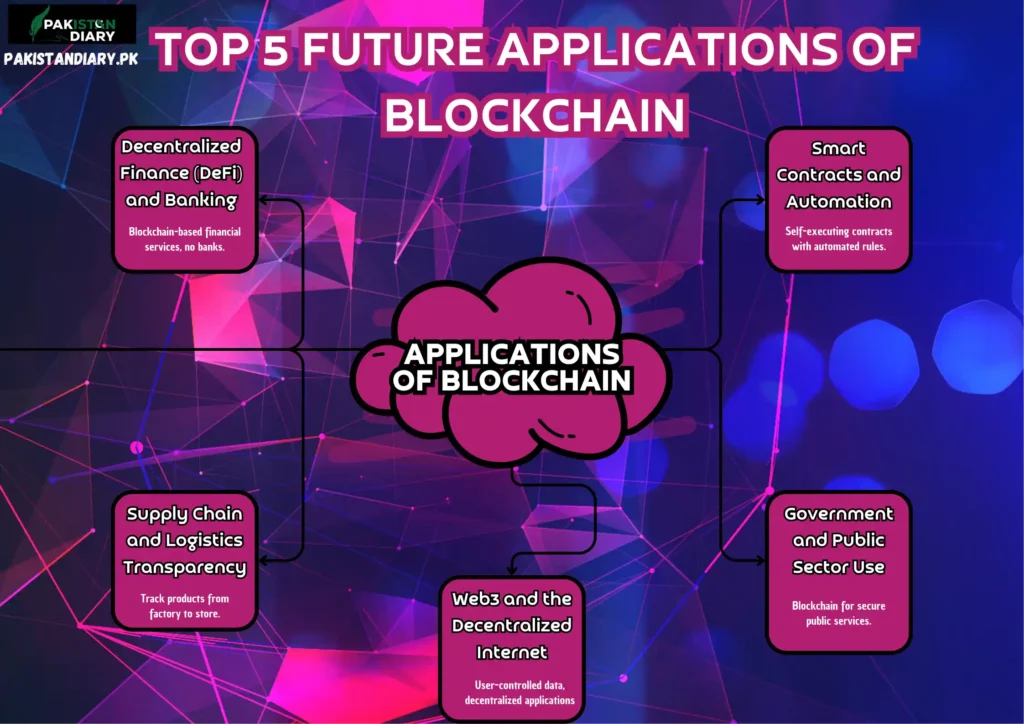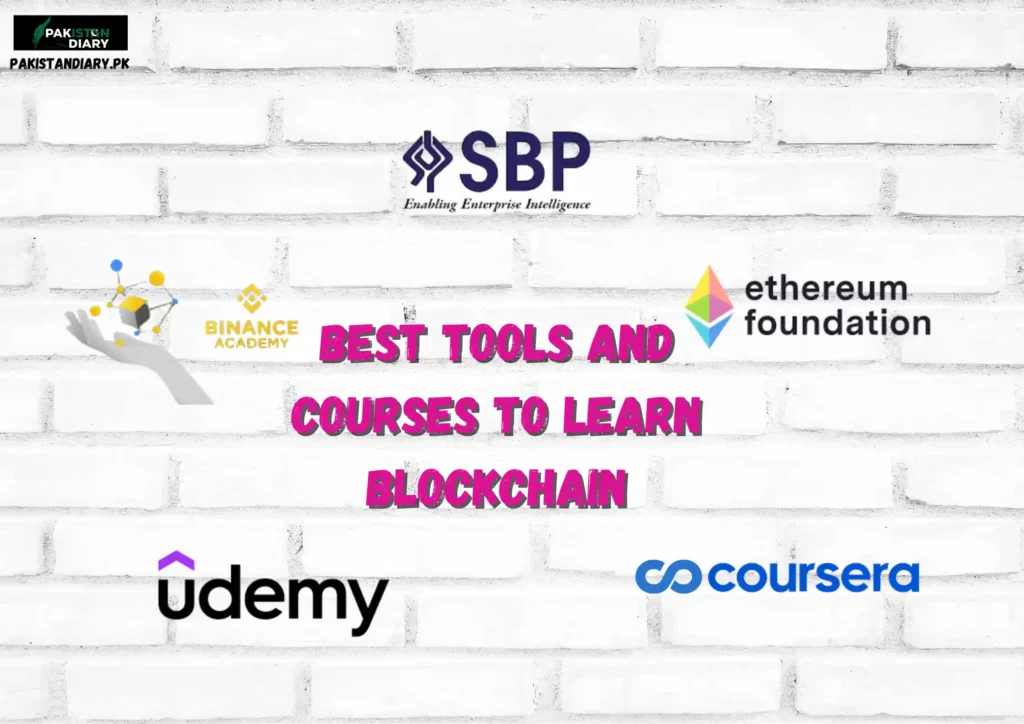Most people know blockchain only because of Bitcoin. But blockchain is not just about digital currency. In fact, it is much bigger than that.
By 2025 and beyond, blockchain could change many industries in Pakistan and around the world. From how we send money, sign contracts, vote, store health records, and even buy vegetables, blockchain has the power to change everything.
Many people ask: What is blockchain’s future? Is it just hype? The answer truth is that the companies, governments, and even schools are starting to explore how blockchain can make systems more secure, open, and fair.
A report by the World Economic Forum disclosed that the 10% of the world’s GDP could be stored on blockchain technology by 2030. This shows how serious it is.
How Blockchain is Evolving Beyond Cryptocurrency
In the beginning, blockchain was used mostly for digital coins like Bitcoin. Now, it is being used for many other things. Here are some ways blockchain is growing:
From Bitcoin to Enterprise Blockchain
Bitcoin uses blockchain to record transactions. But now companies are using blockchain to manage data, verify identities, and create smart systems.
Big platforms like Ethereum 2.0 and Hyperledger allow developers to create tools that do not need a middleman (like a bank or lawyer).
These systems are called “enterprise blockchains” because they help companies manage tasks in a secure and digital way.
Identity Verification and Data Security
Many people worry about their private data being stolen. Blockchain can help keep this information safe.
For example, instead of showing your ID card at every checkpoint, use a secure blockchain code that proves who you are.
Smart Contracts & Automation
Smart contracts are like digital agreements that run automatically when conditions are met.
Example: You buy a house and the payment is released only when all documents are verified. No need for lawyers or brokers.
Platforms: Solana and Cardano support fast and cheap smart contracts.
Benefits:
- No need to trust the other party
- Saves time and cost
- Works for legal documents, insurance, property deals, and more
Decentralized Applications (DApps)
DApps are apps that run on blockchain. They don’t need a single owner or control center. This means no one can change the rules or block your access.
Examples of DApps include:
- Finance apps (like Uniswap)
- Games (like Axie Infinity)
- Voting tools

Top 5 Future Applications of Blockchain
Let’s now talk about how blockchain will be used in the real world, especially after 2025. These are some of the most exciting areas.
1. Decentralized Finance (DeFi) and Banking
DeFi means using blockchain to do banking without traditional banks.
Instead of filling forms and waiting for approvals, DeFi allows users to:
- Borrow and lend money
- Earn interest
- Send money globally
These services run automatically on smart contracts.
Example: Ethereum is one of the most used platforms for DeFi. According to DeFiLlama, DeFi apps had over $45 billion locked in smart contracts in early 2024.
In Pakistan, where many people don’t have bank accounts, DeFi could be a game changer.
2. Smart Contracts and Automation
A smart contract is like a normal agreement, but digital. It runs by itself when certain rules are met. No need for lawyers or witnesses.
This is useful in:
- Buying and selling property
- Hiring freelancers
- Insurance claims
Example: Cardano and Solana are two blockchain platforms that allow people to make smart contracts.
In Pakistan, smart contracts can help reduce corruption and fraud in real estate.
3. Supply Chain and Logistics Transparency
Every year, billions are lost because of fake products and stolen goods. Blockchain can help track products from the factory to the shop.
Example: IBM Food Trust uses blockchain to track food from farms to stores. You can scan a QR code and see where your apple came from.
For Pakistan’s agriculture sector, this could help farmers get better prices and reduce wastage.
| Traditional Supply Chain | Blockchain Supply Chain |
| Easy to fake products | Products can be verified |
| Paper-based | Digital & permanent |
| Slow updates | Real-time tracking |
4. Web3 and the Decentralized Internet
The current internet is controlled by big companies. In Web3, users control their own data and identities.
This allows:
- Artists to sell digital art (NFTs)
- Groups to work together without central bosses (DAOs)
- Better privacy and freedom
Example: Polygon and Polkadot are helping build Web3 apps. Many Pakistani developers are now creating NFTs and Web3 games using these platforms.
5. Government and Public Sector Use
Governments around the world are exploring blockchain to improve public services.
Examples of future uses include:
- Voting online in a secure way
- Digital land records to reduce land disputes
- Digital identity cards
In Dubai, the government has a complete “Blockchain Strategy” where all documents will be managed on blockchain.
In Pakistan, NADRA could use blockchain to store citizen data more securely.
Challenges and Limitations of Blockchain
Even with so many benefits, blockchain is not perfect. There are still some major challenges.
Scalability and Speed
Right now, blockchain can be slow and expensive. For example, Ethereum gas fees (transaction fees) can go up to $50 during busy times.
Developers are working on solutions like:
- Layer 2 chains (e.g., Arbitrum, Optimism)
- Ethereum 2.0 (Proof of Stake model)
Regulatory Issues
We need clear rules so developers and companies feel safe using it. Laws around blockchain are not clear. Some governments support it, others ban it. In Pakistan, the State Bank of Pakistan (SBP) has warned against using cryptocurrencies, but blockchain as a technology is still not banned.
Examples:
- El Salvador made Bitcoin legal.
- China banned crypto mining.
We need global rules to make blockchain safer and more reliable.
Energy Use and Sustainability
Some blockchains, like Bitcoin, use a lot of electricity. This is bad for the environment.
Good news: Many blockchains are moving to eco-friendly methods like Proof of Stake.
Table: Energy Comparison
| Blockchain Type | Energy Use | Eco-Friendly? |
| Bitcoin (Proof of Work) | Very high | No |
| Ethereum 2.0 (Proof of Stake) | Low | Yes |
| Solana | Very low | Yes |
Predictions for 2030:
Let’s look into the future and see where blockchain is headed in the next 5–10 years.
Healthcare: Digital Patient Records
Hospitals can use blockchain to store medical data. This means you won’t have to carry paper files.
Your doctor in Lahore could access your scan done in Islamabad—instantly and securely.
This can reduce delays, save lives, and improve treatment quality.
AI and Blockchain Together
Artificial Intelligence (AI) can use blockchain to manage data in a safe and fair way. For example, AI can learn from data stored on blockchain without breaking privacy laws.
This combo will be powerful for:
- Fraud detection
- Personalized healthcare
- Education tools
Central Bank Digital Currencies (CBDCs)
Many countries are now testing digital versions of their national money. This is called a Central Bank Digital Currency.
- China is testing the Digital Yuan.
- India is testing the Digital Rupee.
- Pakistan may consider a Digital Rupee (Digital PKR) under SBP’s future fintech framework.
CBDCs can help the government track spending, fight fake currency, and improve tax collection.
Personal Experience: My First Blockchain Project
In 2022, I worked with a local startup that wanted to use blockchain for land records in rural areas. We created a simple demo where farmers could see their land info using a QR code.
What amazed me was the reaction from the farmers. Even though they didn’t fully understand “blockchain,” they loved how transparent and fast it was. They no longer had to deal with middlemen or fear losing documents.
That experience made me believe that blockchain isn’t just for tech people—it can really help everyone.

Best Tools and Courses to Learn Blockchain
Here are some free and paid tools for learning blockchain technology, especially useful for students and beginners in Pakistan:
| Tool/Course | Description | Link |
| Coursera – Blockchain Specialization | Learn basics of blockchain, Ethereum, DeFi | https://www.coursera.org |
| Udemy – Blockchain for Beginners | Easy-to-understand lessons with live projects | https://www.udemy.com |
| Binance Academy | Free learning portal on blockchain and crypto | https://academy.binance.com |
| Ethereum.org Developer Docs | Learn how to build smart contracts | https://ethereum.org/en/developers |
| SBP Innovation Office Reports | Learn about local blockchain regulations | https://www.sbp.org.pk |
Conclusion
Blockchain is no longer just about Bitcoin. It is a powerful tool that can change how we live, work, and trust each other.
From finance and farming to health and identity, blockchain has the power to solve many of Pakistan’s challenges.
But for this change to happen, we need:
- Education
- Support from the government
- More developers and startups
If you’re curious about the future, now is the best time to learn. Join a course, try a blockchain app, or follow tech news.
Which blockchain trend are you most excited about? Let us know in the comments and don’t forget to share this blog with friends who are curious about the future of technology in Pakistan.





